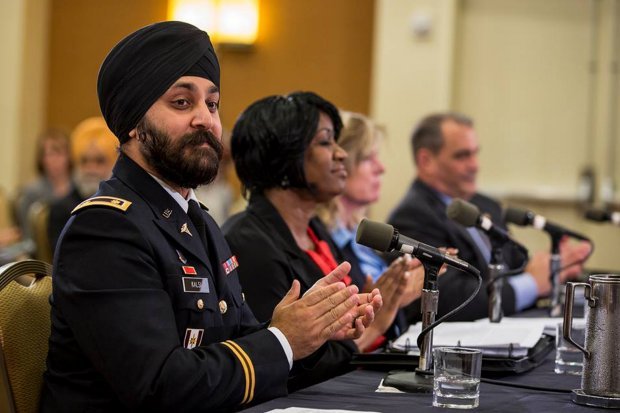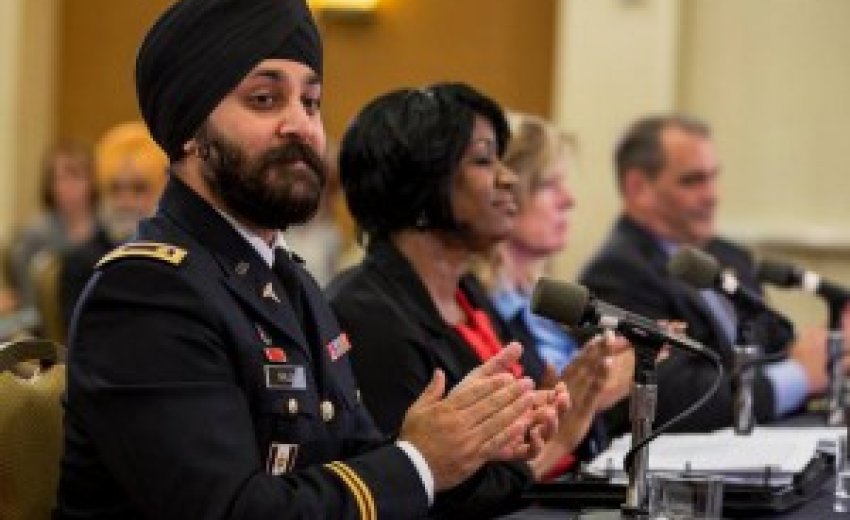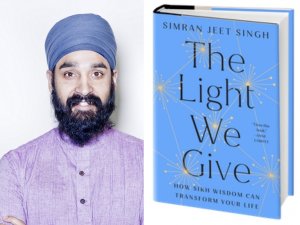 |
| Major Kalsi at the United States Civil Rights Commission hearing on June 1, 2013. (The Sikh Coalition & Russell Brammer) |
![]()
The Army granted him a waiver to serve while keeping the turban and beard required by his Sikh faith. Major Kamal Kalsi is still fighting to change the policy that almost kept him out.
U.S. Army Major Kamal Singh Kalsi comes from a long tradition of military veterans. His great grandfather served in the Royal British Army. Both his father and grandfather saw combat while serving in the Indian Air Force. So when recruiters approached him and asked him to join the military in 2000, Kalsi jumped at the opportunity.
“I was in medical school at the time, and I was really excited to continue the family tradition of military service,” Kalsi explains. “They also offered to cover the cost of my medical schooling, so it was a no-brainer. You’re going to give me financial support and I get to serve my country? How could anyone turn down such a great opportunity?”
What seemed like an easy decision soon brought its own challenges. Major Kalsi is an American physician whose religion—Sikhism—mandates that he maintain a turban and beard. These two aspects of his physical appearance do not comport with military appearance regulations, which presumptively forbid religious headcoverings and beards.
At the time of his enlistment, it had been more than two decades since the Army had enacted a presumptive ban against religious minorities who maintain visible articles of faith, and it did not seem likely that Major Kalsi would receive an accommodation to serve while upholding his distinct identity. Kalsi and his team of lawyers, led by the Sikh Coalition with assistance from an international law firm, McDermott Will & Emery, worked on securing this accommodation. As he describes it, Major Kalsi’s commitment to the lengthy process drew from his intense desire to serve and better his country.
“It was very clear to me that our country had not fully healed from the violence of 9/11,” Kalsi describes. “As an American and as a Sikh, I felt a need to be proactive in fighting hatred and injustice, and my value systems teach me that the best way to do this is through service.”
After nearly two years of paperwork and support from both the White House and Congress, Major Kalsi was eventually accommodated in 2009. Representative Joseph Crowley (D-NY) helped spearhead the effort to receive this accommodation, and was one of almost 50 members of Congress to sign and send a letter of support to the Department of Defense.
Last week, Major Kalsi visited Capitol Hill and met with members of Congress to raise awareness about Sikhs and the challenges of ensuring equal opportunities in the military. During this trip Major Kalsi also attended the first-ever Congressional Diwali celebration, where Rep. Crowley reiterated his support for the right of Sikhs to serve in the military without compromising their religious requirements and voiced his appreciation for Major Kalsi’s service to the nation.
“He has won numerous awards for his service, and I believe it’s time that we let all Sikhs serve in the United States Armed Services.”
Since 2009, Major Kalsi has been serving as an Emergency Medicine physician with the U.S. Army. He was deployed to Helmand province in Afghanistan, and upon his return was awarded the Bronze Star Medal for his service, which included resuscitating two fellow soldiers who were clinically dead.
His colleague and roommate in Afghanistan, Captain Ryan Hepworth, attested to the value of his time with Major Kalsi during deployment.
“I’m from rural Alabama and had never met a Sikh before meeting Kamal. I came to really love and respect the guy.”
“I’m from rural Alabama and had never met a Sikh before meeting Kamal. I came to really love and respect the guy,” Captain Hepworth said. “I learned from him about how well Sikhs used to be represented in the military and how it’s expected of them to be protectors of the realm. I think that’s great and very similar to my views—and I think so many of us Americans could learn from that.”
While Major Kamal Singh Kalsi and two other Sikh-Americans—Captain Tejdeep Singh Rattan and Corporal Simranpreet Singh Lamba—have received waivers from the presumptive ban that keeps devout Sikhs out of the military, the policy remains in place and makes it difficult for Sikh-Americans to enter the service.
There are two arguments in particular that have been regularly cited by the U.S. military. First is the concern about properly fitting a gas mask over the turban and beard. The three Sikh-American soldiers currently serving have been able to tie their beards and use the gas masks properly, in compliance with military health and safety requirements, and have clearly shown that this is not a problem.
Second is the concern of unit cohesion and whether allowing Sikhs to serve will undermine esprit de corps. Brief conversations with soldiers who served with Major Kalsi indicate that this concern does not hold much weight. For instance, Captain Hepworth responded to this question without flinching and spoke in support of reversing the current policy.
“I don’t see this adjustment to uniformity to be a problem, and I never saw any issues or problems when we were deployed in Afghanistan together,” Hepworth said. “Based on my experiences with Kamal—I just trust him. He’s a complete professional, and he’s the right guy for the job. I’d work a trauma with him any day. I’d let him work on me. I’d even let him operate on my family.”
Another colleague of Major Kalsi, Captain Roni Paul, also spoke to this issue. Captain Paul joined the U.S. Army after graduating from high school in 1991, and he explains that spending time with Major Kalsi really changed his mind on how he viewed the issue.
“It’s almost like brainwashing, but we are really taught to believe that if your haircut isn’t right or your uniform isn’t looking good, then you have no place in the military,” Captain Paul describes. “And then all of a sudden, here comes a great asset to the military. Why should we discriminate against him just because he has a turban and beard? It has no bearing on how much someone can contribute to our country or our military.”
Captain Paul followed his statement by reflecting on how getting to know Major Kalsi changed the way he thinks about the issue.
“If you had asked me in 1991 when I first started, I would have said ‘No way should we allow someone with a turban and beard. ” Captain Paul said. “Now that I have much more experience and wisdom, I realize that our military is losing a lot of great people. We’re not letting certain Americans serve in the military because of our own bias, and this goes against our basic values as a nation. Sikhs still can’t serve in the military freely, and that feels wrong to me. This policy needs to change, and it needs to change soon.”






